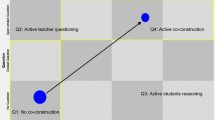Summary
Knowledge acquisition in collaborative problem solving is mainly realized by two activities: (1) when participants mutually impart their knowledge and (2) when they elaborate their knowledge together. Both activities are favoured by differences in the participants’ prior knowledge. To support this thesis, an experimental study and a cognitive simulation are described. In the study, pairs of students were systematically taught complementary knowledge about qualitative resp. quantitative aspects of classical mechanics. During the subsequent collaborative problem solving the students successfully exchanged information about their complementary knowledge. Students who had been taught knowledge about qualitative aspects of physics gained more from their partners than students who had been taught knowledge about quantitative aspects. A cognitive model simulates problem solving and learning under the conditions set up in the study. In a simulation study based on the cognitive model it was possible to reconstruct the main results of the experimental study. Finally, the role of dialogue analysis and external representations are discussed and conclusions for the design of computer systems supporting collaborative problem solving are drawn.
Zusammenfassung
Wissenserwerb bei der Kooperation vollzieht sich vor allem durch zwei Aktivitäten: (1) gegenseitige Wissensvermittlung und (2) gemeinsame Elaboration des Wissens. Für beides ist unterschiedliches Vorwissen der Beteiligten eine günstige Voraussetzung. Um diese These zu unterstützen, wird im vorliegenden Artikel eine experimentelle Studie dargestellt, in der Paaren von Schülerinnen systematisch komplementäres Vorwissen über qualitative bzw. quantitative Aspekte der klassischen Mechanik vermittelt wurde. Beim anschließenden kooperativen Problemlösen vermittelten die Schülerinnen sich gegenseitig erfolgreich Teile ihres Wissens. Schülerinnen, die zuvor Wissen über qualitative Aspekte der Physik erworben hatten, lernten dabei mehr von ihren Partnerinnen als Schülerinnen, die zuvor Wissen über quantitative Aspekte erworben hatten. Ein nachfolgend implementiertes kognitives Modell simuliert kooperatives Lernen und Problemlösen unter den Bedingungen der Studie und ist in der Lage, die zentralen Befunde der Studie zu rekonstruieren. In der Diskussion wird auf die Rolle des Dialogverhaltens und der Nutzung externer Repräsentationen für das kooperative Lernen und Problemlösen eingegangen. Abschließend werden Schlußfolgerungen für die Gestaltung von Computersystemen zur Unterstützung kooperativen Lernens und Problemlösens gezogen.
Similar content being viewed by others
Author information
Authors and Affiliations
Corresponding author
Rights and permissions
About this article
Cite this article
Kneser, C., Fehse, E. & Hermann, F. Kooperatives Lernen auf der Grundlage komplementären Vorwissens: ein Experiment und eine Simulationsstudie. Kognit. Wiss. 9, 17–31 (2000). https://doi.org/10.1007/s001970000027
Published:
Issue Date:
DOI: https://doi.org/10.1007/s001970000027




